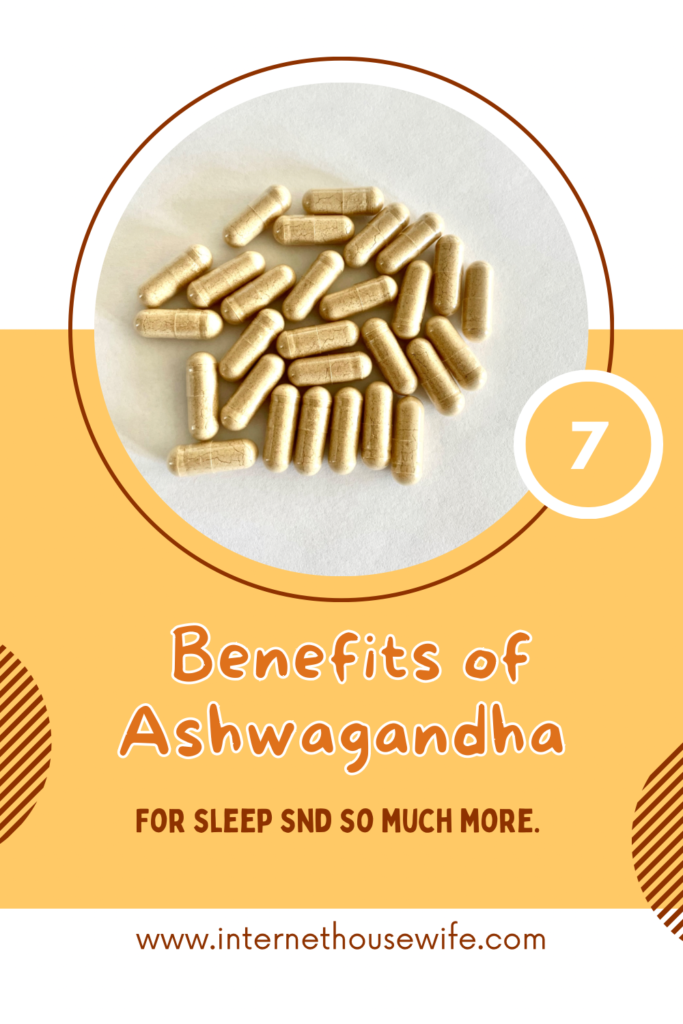7 Benefits of Ashwagandha For Sleep, And So Much More
The benefits of Ashwagandha include reducing stress and anxiety, improving sleep quality, enhancing brain function, boosting immune system function, and supporting healthy thyroid function.
While more research is needed to fully understand the potential benefits of ashwagandha, it is generally considered safe when taken as directed and may be a useful supplement for those looking to support their overall health and well-being.

What is Ashwagandha?
Ashwagandha, an adaptogenic herb also known as Withania Somnifera, is a plant that is native to the dry regions of India, northern Africa, and the Middle East. It is a small shrub with yellow flowers and red fruit and has been used for centuries in traditional Ayurvedic medicine as a natural remedy for various ailments.
The root is the most prized part of the plant for medical purposes and is used to make various forms of ashwagandha supplements, including powders, capsules, tinctures, and extracts.
How is Ashwagandha harvested?
Traditionally, ashwagandha roots are harvested by hand. This is because the roots can be quite delicate and can easily break or be damaged if machine-harvested.
The time-consuming process of harvesting ashwagandha by hand involves carefully digging up the roots from the soil, being careful not to damage the plant or the root itself. Ensuring the root stays intact for processing.
7 Benefits of Ashwagandha!
#1 Ashwagandha for Sleep
Here are a few ways that ashwagandha may help with sleep:
- Reducing stress and anxiety: Ashwagandha is known for its adaptogenic properties, which means it can help the body cope with stress. When taken regularly, ashwagandha has been shown to lower cortisol levels, a hormone that is often elevated in people experiencing chronic stress. By reducing cortisol levels, ashwagandha may help calm the mind and reduce anxiety, which can help improve sleep quality.
- Promoting relaxation: Ashwagandha contains compounds that have sedative properties and can help induce relaxation. These compounds may act on the GABA receptors in the brain, which are responsible for promoting relaxation and sleep.
- Improving sleep quality: Studies have shown that ashwagandha can improve the quality of sleep by increasing the amount of time spent in restorative deep sleep, also known as slow-wave sleep. Slow-wave sleep is important for physical and mental restoration, and a lack of it can lead to feelings of fatigue and cognitive impairment.
#2 How Does Ashwagandha Help Stress And Anxiety?
Ashwagandha has been traditionally used for its anxiety-reducing properties,
- Reducing cortisol levels: Ashwagandha has been shown to reduce cortisol levels in the body, which is a hormone that is often elevated in people experiencing chronic stress and anxiety. Elevated cortisol levels can lead to anxiety and depression, so by reducing cortisol levels, ashwagandha may help reduce anxiety symptoms.
- Improving brain function: Ashwagandha may improve brain function and cognitive abilities, including memory and attention. This can help individuals better cope with stress and anxiety by improving their ability to problem-solve and think rationally in stressful situations.
- Modulating neurotransmitters: Ashwagandha has been shown to modulate certain neurotransmitters, including GABA and serotonin, which are both important for regulating mood and anxiety. By enhancing the function of these neurotransmitters, ashwagandha may help reduce anxiety symptoms.
- Acting as an adaptogen: Ashwagandha is classified as an adaptogen, which means that it helps the body adapt to stressors and maintain homeostasis. By supporting the body’s natural stress response, ashwagandha may help reduce anxiety symptoms and improve overall well-being.
#3 Ashwagandha and Brain Function
- Reducing stress and anxiety: Ashwagandha has been shown to have anxiolytic properties, which means it can help reduce anxiety and promote relaxation. By reducing stress and anxiety, ashwagandha may help improve cognitive function and focus.
- Improving memory and cognitive performance: Some studies have suggested that ashwagandha may improve memory and cognitive function. speed.
- Modulating neurotransmitters: Ashwagandha has been shown to modulate certain neurotransmitters, including acetylcholine and serotonin, which are important for cognitive function and mood regulation. By enhancing the function of these neurotransmitters, ashwagandha may improve brain function.
- Supporting neuroprotection: Ashwagandha contains compounds called withanolides, which have been shown to have neuroprotective properties. These compounds may help protect against damage to the brain and promote healthy brain function.
#4 Inflammation:
Ashwagandha has been shown to have anti-inflammatory properties, which may help reduce inflammation and pain throughout the body.
#5 Balance Hormones:
Ashwagandha may help balance hormone levels, particularly in women. It may help regulate cortisol, thyroid hormones, and testosterone.
#6 Immune Support:
Ashwagandha has been shown to have immune-boosting properties, which may help strengthen the immune system and prevent infections.
#7 Enhanced Athletic Performance:
Ashwagandha may help improve physical performance and endurance, making it a popular supplement among athletes and bodybuilders.
Add These Ingredients To Improve Ashwagandha Performance
Ashwagandha is often used in combination with other ingredients to enhance its benefits. Here are a few common ingredients that are often added to ashwagandha supplements to improve their efficacy:
- Black pepper extract: Black pepper extract, also known as piperine, is often added to ashwagandha supplements to increase its bioavailability. Piperine can help improve the absorption and utilization of ashwagandha in the body, making it more effective. “Bioperine” or “Piperine” both are bioenhancer to improve nutrient absorption and bioavailability,
- Black Seed Oil: There is some evidence to suggest that black seed oil and ashwagandha may have complementary effects when taken together. For example, both supplements have been shown to have anti-inflammatory properties, which may help reduce inflammation and pain throughout the body.
- Turmeric extract: Turmeric extract contains compounds called curcuminoids, which have anti-inflammatory and antioxidant properties. When combined with ashwagandha, turmeric may help enhance its anti-inflammatory and antioxidant benefits.
- Sea Moss: Sea moss is a good source of several essential vitamins and minerals, including iron, magnesium, iodine, zinc, and vitamins A, B, C, and K. The two are both natural remedies and combined together, may have complementary effects.
- Bacopa extract: Bacopa is an herb traditionally used in Ayurvedic medicine to support brain function and memory. When combined with ashwagandha, bacopa may help improve cognitive function and memory.
- Burdock Root: Complementary effects, which may help reduce inflammation and pain throughout the body. Additionally, ashwagandha may help regulate cortisol levels, which can help alleviate stress and anxiety, while burdock root may help support liver function and detoxification.
- Rhodiola extract: Rhodiola is an adaptogenic herb commonly used to support stress relief and improve cognitive function. When combined with ashwagandha, Rhodiola may help enhance its adaptogenic and cognitive benefits.
- L-Theanine: L-theanine is an amino acid found in green tea that has been shown to promote relaxation and reduce anxiety. When combined with ashwagandha, L-theanine may help enhance its anxiolytic properties.
- Ginger Root: synergistic effects when taken together. When combined with ashwagandha, ginger may help improve the absorption of ashwagandha in the body, making it more effective.
- Macca Root: Both maca and ashwagandha are believed to have immune-boosting properties. Combined, they may help enhance immune function and protect against illness and disease.
- Magnesium: the two may work together to provide greater benefits for athletic performance. combined with ashwagandha, which may also have benefits for sleep, the two may help improve overall sleep quality and duration.
Choosing the right Ashwagandha Supplements
Third-party validation can be an important factor to consider when choosing a dietary supplement because it provides an objective evaluation of the product’s quality and safety.
This validation may involve testing for contaminants, verifying the potency of the active ingredients, and evaluating the accuracy of the label claims.
Some examples of third-party organizations that provide validation for dietary supplements include NSF International, US Pharmacopeia (USP), ConsumerLab.com, and Informed-Choice. These organizations have established standards and testing procedures that supplements must meet in order to receive their validation.
5 Best Ashwagandha Supplements:
A typical full dose of ashwagandha extract (root or leaf) ranges from 300 mg to 500 mg taken one to two times per day.
#1 Clean Nutraceuticals
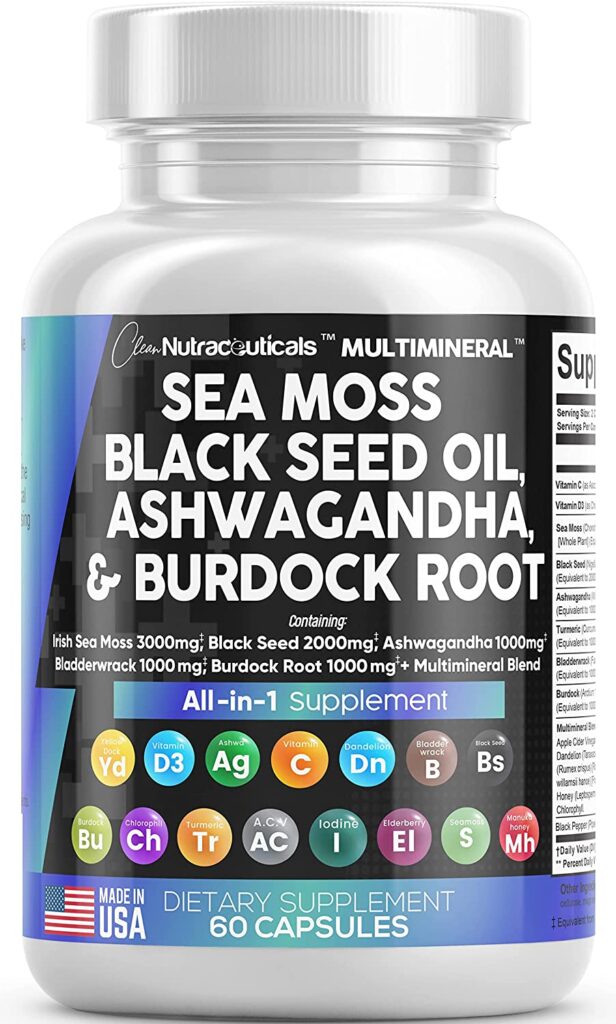
#2 VITAL HERBAL
One capsule a day.
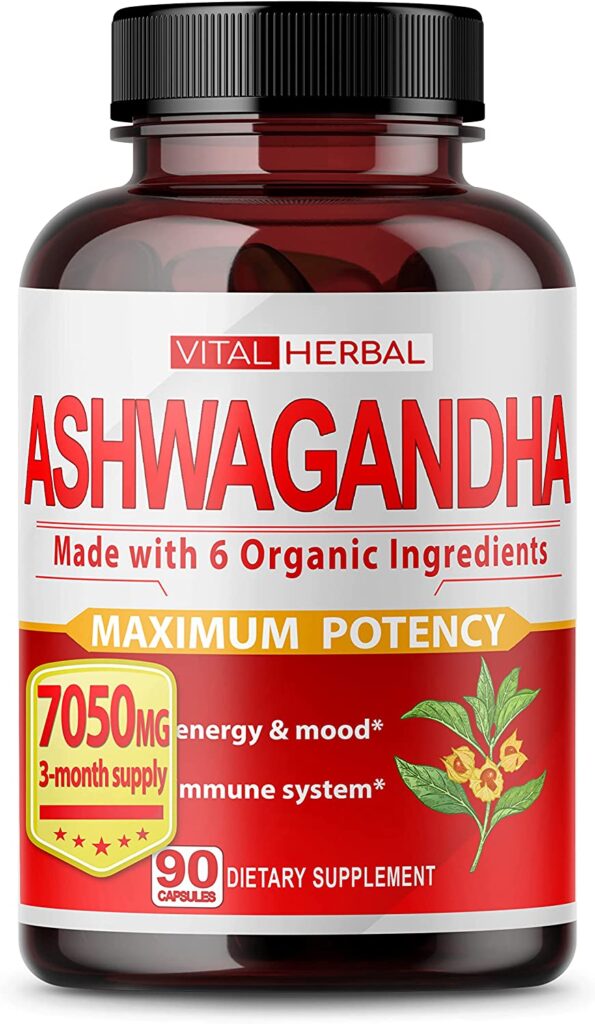
#3 New Chapter Magnesium + Ashwagandha Supplement
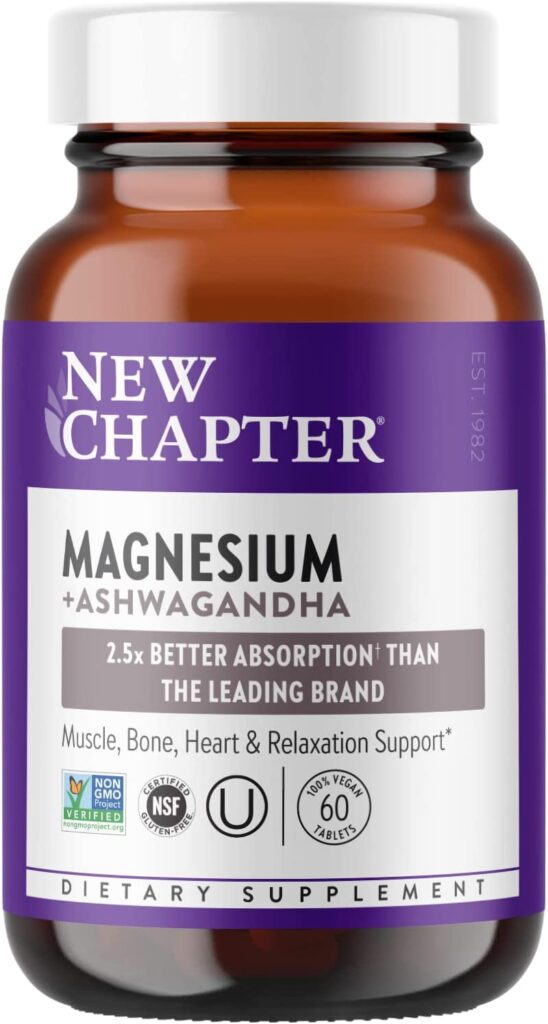
#4 Bronson, Extra Strength
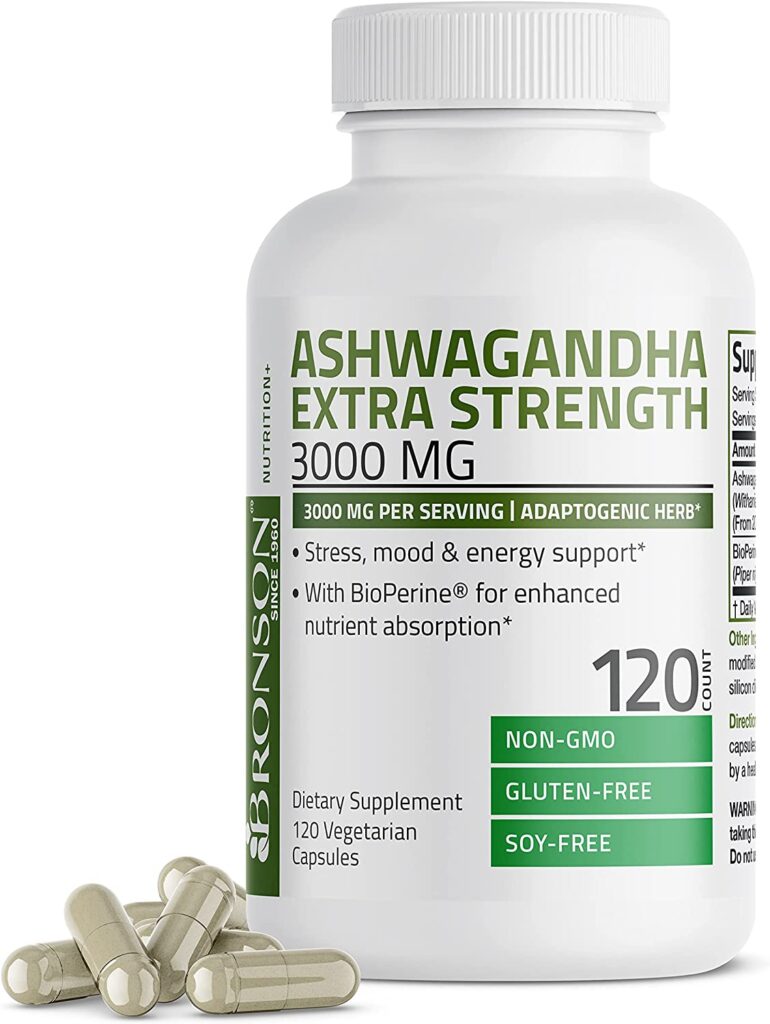
#5 Physician’s CHOICE Organic Ashwagandha
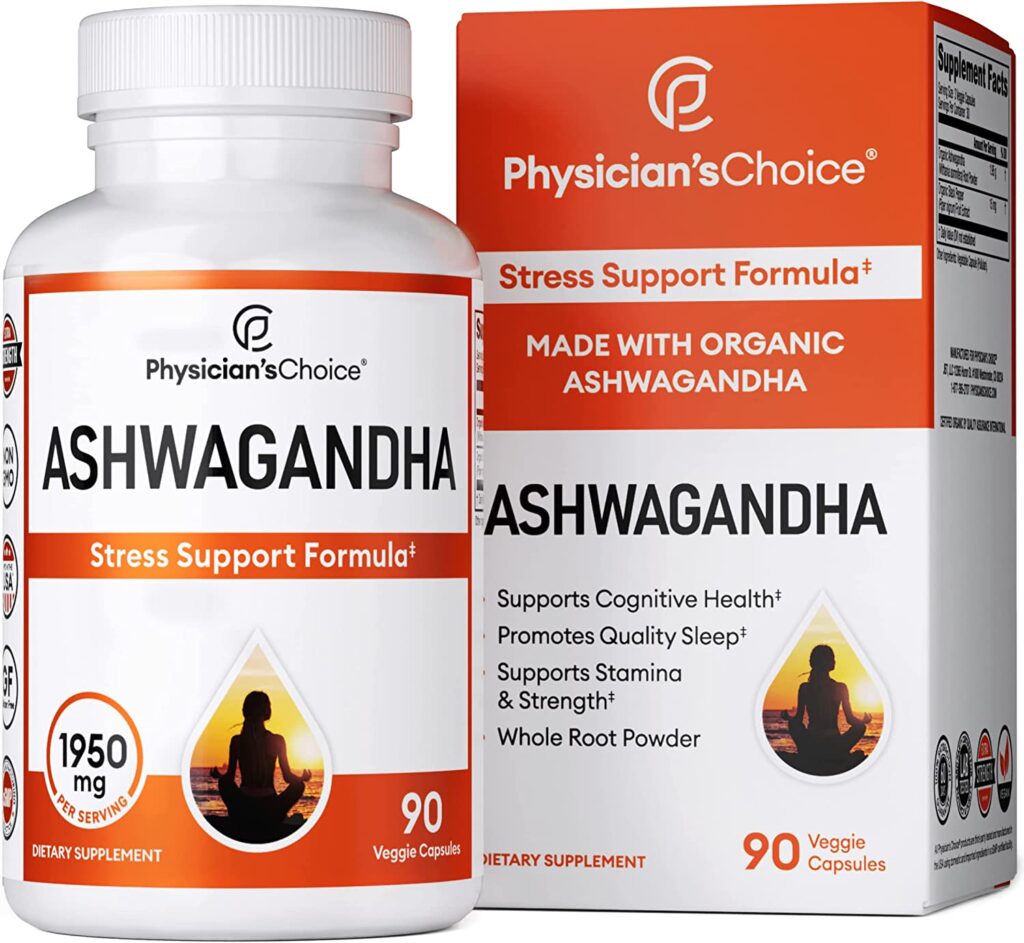
2 other great products that may aid in sleep, anxiety, and stress.
Real Clarity, and MagMelan All-In-One Supplement
Ashwagandha Side Effects:
Some common side effects of ashwagandha may include:
- Upset stomach, diarrhea, or nausea
- Headache or dizziness
- Drowsiness or sedation
- Dry mouth or throat
- Changes in blood pressure or blood sugar levels
Much like medications, supplements can cause similar side effects. The duration of side effects from ashwagandha can vary depending on the individual and the severity of the symptoms. In most cases, side effects are mild and short-lived and typically resolve on their own within a few days to a week after stopping the supplement.
It is best to speak with a healthcare provider for personalized advice and guidance before starting ANY new medications or supplements.
